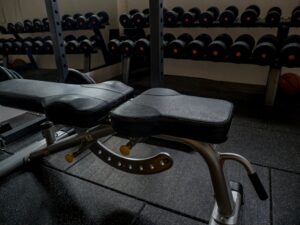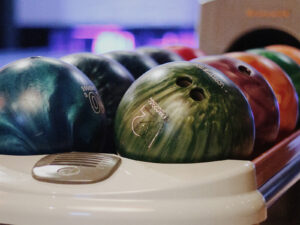Gary Staerck: Embracing the individual

Gary Staerck has never really been into participating in sport since becoming an adult.
“I would rather let the bus go past and get the next bus, than run for it,” he said. “I’m not one to run for anything.”
But having worked in theatre, stage production and events management since 2001, Gary knows one thing he is really good at: planning.
So one cold night after Christmas, with his three kids and wife already in bed, the Scotsman set to work on creating a New Year’s resolution that would fill the calendar – 12 activities in 12 months for five different charities that he holds close to his heart, including a children’s hospital, mental health support, and autism awareness through Scottish Autism.
Gary and his wife Tricia started the ASD testing process for their five-year-old twins Amelia and Scarlet this time last year, and despite the COVID-19 pandemic causing unavoidable delays in getting a formal diagnosis, he sees the process as a positive during strange times.
“It’s nice to have someone else confirm why they do things a little differently, rather than us just thinking we are not doing things right and we are bad parents.
“We have had discussions with Polly [their nine-year-old daughter] and Amelia, who is lower on the spectrum than her twin sister and has become a mothering figure to her because she knows that Scarlet melts down a lot and just needs a cuddle when that happens.
“She is only five, but she is very protective of her twin sister and it’s very nice to see.
“You also have to take a step back and look at it from the outside. It’s just a different way of thinking and doing.
“If they have autism, they have autism; if they have dyslexia, they have dyslexia, that’s who they are. Everybody is different and you’ve got to embrace that.
“If you start seeing it as an issue or a problem then it will become one. Whereas if you just see it as something that’s different, like a different hair colour or a different way of doing things, you can move on because that’s positive.”
Gary is a huge advocate of self-empowerment and wants to pass that on to his children as they grow and meet new people.
“Amelia, the youngest by two minutes, has a strawberry birthmark on her forehead, right between her eyes. It’s not as pronounced now as it used to be, but it used to be bright red.
“We have said from the very beginning, ‘That’s yours, you tell people what it is, and never be shy to hide it away.’
“Some kids would point and the parent would pull them away, but we’d help bring the kid back and explain so that it makes sense to them. It’s the parents who are the ones that are embarrassed to ask any questions, but we’re not that kind of people. She’s got it and that’s who she is.
“This year needs to be positive. It’s already trying to be negative and we just have to push as many positives forward as possible.”
“It’s about not concentrating on things that you can’t do, but pushing yourself and giving it your best.”
Gary Staerck
The start of 2021 has already seen Gary lose a close friend, in addition to the further lockdown restrictions and the challenge of home-schooling which has hit millions of people across the country.
But as well as a rollercoaster 2020, these experiences have only reminded Gary about the purpose for his comprehensive New Year’s resolution.
“Last year was a bit of a year for everybody. We all went to Australia with my work and then COVID-19 hit so we had to come home, went on furlough, and my stepsister who was 29 had a heart attack and passed away in August.
“I’ve always been saying I want to do something for charity and it’s an inspiration for me to try and do this now.
“Whatever age you are, you don’t know what’s coming next. If you are going to do something, you just need to get on with it or you might never get around to it.
“Running is out of my comfort zone, especially for people who know me, so this is pretty amazing.
“It’s about not concentrating on things that you can’t do, but pushing yourself and giving it your best.”
Aside from finishing all the Christmas alcohol before January, Gary admitted that the most challenging aspect of his huge endeavour was just getting started.
But after only a few jogs with his daughter Polly, that opinion is quickly changing.
“I always see people doing a 5k or 10k and be really happy with themselves at the end of it, feeling amazing, and I don’t understand how. I want to learn why they feel like that and understand how we get there.
“I’m not very good at sport and exercise. I did gymnastics and trampolining when I was the twins’ age and there has never been anything since, but we chat for a long time on the run and it’s really good to reconnect properly.
“We don’t talk about anything serious; we spent a good 15 minutes the other night talking Peppa Pig.
“You can spend all this time in the house together, but you are not necessarily chatting as everyone is doing their own thing – Polly is at that stage, especially with lockdown, where it’s all about online gaming and she spends a lot of time in her room with her computer pals.”
A former gamer himself, Gary is looking forward to the Sick Kids Save Point 24-hour gaming session in October, where his family will work as a team to play computer games for an entire day having bought a Nintendo Switch over Christmas.
The late night should be no problem for his lively twins who, prior to the pandemic, were cherished members of a local cheerleading team which gave them the extensive benefits of sport that Gary is now re-discovering for himself.
“They just love being active. They were both due to start swimming lessons before COVID-19 and wanted to get into gymnastics or trampolining.
“They were supposed to do a cheerleading competition in Glasgow and a week and a half before it, Amelia broke her arm, and we thought she wouldn’t be allowed to go.
“But the club said she could still go to sit on the side and be on the stage with them, and it was amazing how being part of the team and still being there made them both feel.
“Amelia felt so included in what was going on, and Scarlet was so chuffed she was still there because they’d gone through the whole process together and she didn’t want to do it if her sister couldn’t.
“Sport provides structure as well as creative and athletic output, and it uses their energy which is a godsend.
“But being part of something is just as important for them – making friends as part of a team.”


